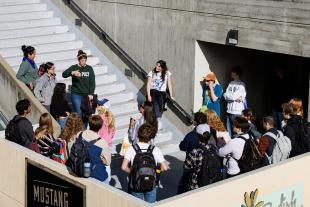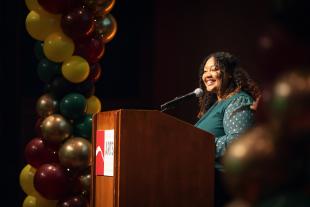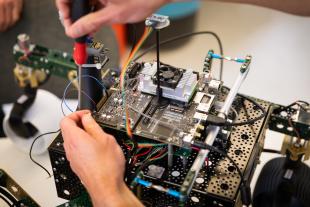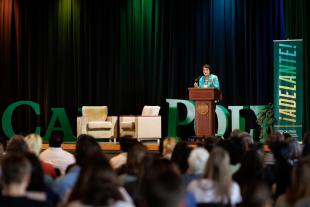Mathematics Professor Named Teaching Innovator by Chronicle of Higher Education
A Cal Poly professor who has championed a method of learning mathematics that reduces student anxiety and closes the gender gap in the discipline has been named to the Chronicle of Higher Education’s first-ever list of Teaching Innovators.
The Chronicle, a national newspaper and website that presents news, information and jobs for college and university faculty and Student Affairs professionals, calls these innovators “faculty members who are using fresh approaches in their classrooms to help their students succeed.”
Mathematics Professor Stan Yoshinobu was recognized for his work in developing workshops to help college math instructors learn to use a teaching method called inquiry-based learning (IBL), which has been shown to improve learning, reduce math anxiety, and close the gender achievement gap in math classes.
In an IBL class, students solve problems and discover mathematical concepts, rather than memorizing information presented to them. With guidance from an instructor, students collaborate to work problems and perform tasks that lead them through an exploration of mathematical strategies and skills. Students learn from their failures and recognize trial and error as an integral part of the learning process.
“You need to actively engage students so they construct their own understanding and ask their own questions. This allows them to become better thinkers,” said Yoshinobu, who also serves as director of Cal Poly’s Academy for Inquiry Based Learning, which aims to improve undergraduate math education by supporting instructors using IBL.
Research has shown that IBL reduces math anxiety by focusing on the process of doing mathematics rather than on memorizing facts or algorithms. Partially because of this shift in focus, IBL mitigates the gender gap currently found in math and science classes. In IBL courses, men and women earn similar grades and continue taking math courses at similar rates.
“We can start addressing some serious social issues by changing how we teach,” Yoshinobu said. “We can make a practical impact.”
Because most math faculty do not have experience with IBL, professors who want to make the switch need professional development. The Chronicle selected Yoshinobu for his efforts to increase available professional development opportunities, saying it places him among those professors “who are in it for the long haul, who constantly revise their teaching to find what works, who deeply want to connect with their students.”
Currently, a limited number of faculty members nationwide have access to IBL workshops each year. With a $3 million grant from the National Science Foundation, Yoshinobu and his collaborators aim to at least triple the number of workshop facilitators and add different types of professional development opportunities to better meet the needs of the math profession.
“As math professors, we can do our regular job in a different way and make a difference in students’ lives. The purpose of this project is to increase the number of people doing that,” Yoshinobu said.
The Chronicle sought nominations from its readers via social media, from college teaching advocates and from higher-education leaders, who represented different fields and diverse types of institutions. The final selections were made by a group of Chronicle editors and reporters.




